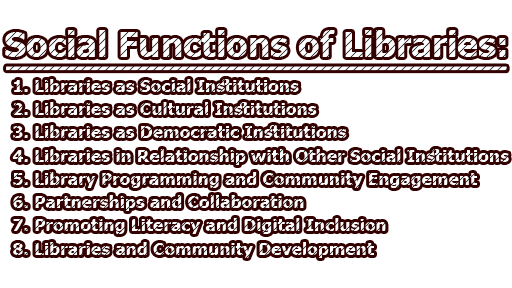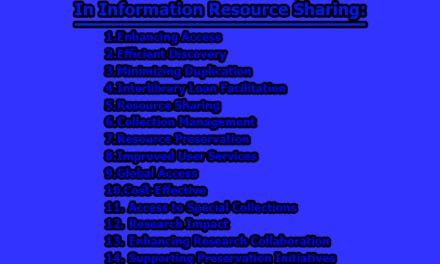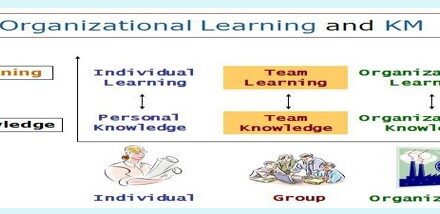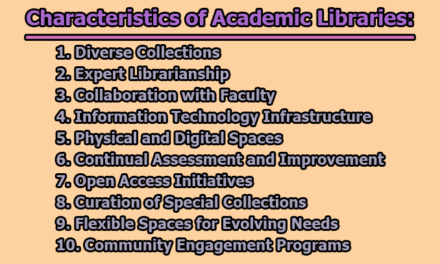Social Functions of Libraries:
Libraries have a rich history dating back to ancient times, with their primary purpose being the preservation and dissemination of knowledge. However, libraries have evolved significantly over the centuries, adapting to changing societal needs and embracing new technologies. Today, libraries serve as more than just repositories of books; they are dynamic social institutions that actively engage with their communities, promote cultural enrichment, and foster democratic values. This article explores the social functions of libraries, focusing on their roles as social, cultural, and democratic institutions. It examines how libraries interact with other social organizations, the impact they have on community development, and the ways in which they promote social inclusion and lifelong learning.
1. Libraries as Social Institutions:
1.1 Historical Evolution of Libraries:
To understand the social functions of libraries, it is essential to trace their historical development. Libraries have been essential components of civilizations throughout history, starting with ancient repositories such as the Library of Alexandria. These early libraries served as gathering places for scholars, fostering intellectual exchange and contributing to the development of knowledge.
1.2 The Modern Library as a Social Institution:
In the modern era, libraries have expanded their social role beyond intellectual pursuits. They have become community centers, offering a range of services and programs that cater to diverse interests and needs. Libraries are designed to be inclusive spaces that welcome people of all ages, backgrounds, and abilities. They provide a safe and welcoming environment for individuals to engage with others, access information, and participate in various cultural and educational activities.
2. Libraries as Cultural Institutions:
2.1 Cultural Preservation:
Libraries have a crucial role in preserving cultural heritage. They collect, catalog, and safeguard a wide range of materials, including books, manuscripts, photographs, oral histories, and archival documents. Through careful preservation techniques, such as climate control and conservation measures, libraries ensure that these cultural artifacts remain intact and accessible for future generations to study, research, and appreciate.
2.2 Access to Cultural Resources:
Libraries provide invaluable access to a wealth of cultural resources. They house extensive collections of books, magazines, newspapers, films, music recordings, and digital content, representing diverse cultural perspectives. These resources enable individuals to explore different cultures, traditions, histories, and artistic expressions. Libraries actively acquire and curate materials that reflect the cultural diversity of their communities, ensuring that patrons have access to a wide range of cultural resources.
2.3 Multilingual Collections:
Libraries recognize the importance of language and linguistic diversity in cultural expression. They actively develop multilingual collections to cater to the linguistic needs of their communities. By acquiring materials in multiple languages, libraries enable individuals to access literature, research, and resources in their native languages. This commitment to linguistic diversity promotes inclusivity and allows library users to engage with cultural materials in the languages they are most comfortable with.
2.4 Cultural Exhibitions:
Libraries serve as venues for cultural exhibitions, showcasing artifacts, artwork, photographs, and other cultural materials. These exhibitions highlight the richness and diversity of local and global cultures, allowing community members to engage with and learn about different cultural traditions, histories, and artistic creations. Libraries often collaborate with artists, historians, and community members to curate and present exhibitions that resonate with their patrons’ interests and promote cross-cultural understanding.
2.5 Cultural Events and Programs:
Libraries host a variety of cultural events and programs that celebrate and promote artistic and cultural expressions. These may include author talks, poetry readings, storytelling sessions, music performances, theater productions, and film screenings. By organizing such events, libraries provide platforms for artists, writers, performers, and community members to come together, share their work, and engage in discussions and celebrations of cultural diversity.
2.6 Heritage Language Programs:
Libraries recognize the importance of preserving heritage languages within their communities. They offer language learning resources, language classes, conversation groups, and cultural exchange programs to support individuals in maintaining and developing proficiency in their heritage languages. These initiatives contribute to the preservation of cultural identities and foster connections between generations, promoting intercultural understanding and appreciation.
2.7 Local History Collections:
Libraries collect, preserve, and provide access to materials that document the local history and heritage of their communities. These collections may include photographs, maps, diaries, oral histories, letters, and other archival documents. By maintaining local history collections, libraries offer community members the opportunity to explore their roots, understand their heritage, and develop a sense of local identity and pride. These collections also serve as valuable resources for researchers and scholars studying the region’s cultural and historical significance.
2.8 Cultural Competency and Inclusion:
Libraries strive to be culturally competent institutions that reflect and respect the diversity of their communities. They actively work to ensure that their collections, services, and programs are inclusive and accessible to individuals from different cultural backgrounds. Libraries provide resources that cater to the needs and interests of diverse populations, including materials in various languages, culturally relevant programming, and outreach initiatives that actively engage underrepresented communities.
2.9 Collaboration with Cultural Organizations:
Libraries collaborate with museums, galleries, historical societies, and other cultural institutions to enhance cultural offerings within their communities. These collaborations involve sharing resources, expertise, and knowledge. Libraries and cultural organizations may co-create exhibitions, develop joint programming, and participate in cross-institutional initiatives. By working together, libraries and cultural institutions can amplify the impact of their efforts, reach broader audiences, and foster a deeper appreciation for culture within the community.
2.10 Promotion of Indigenous Cultures:
Libraries recognize the importance of promoting and preserving indigenous cultures. They actively engage with indigenous communities, establishing partnerships and collaborations to support the preservation of indigenous knowledge, languages, histories, and art forms. Libraries work closely with indigenous knowledge holders and cultural organizations to curate collections, develop programming, and ensure that indigenous voices and perspectives are respected, represented, and celebrated within library spaces.
3. Libraries as Democratic Institutions:
3.1 Equal Access to Information:
Libraries serve as guardians of intellectual freedom and advocates for equal access to information. They provide individuals with the resources they need to make informed decisions, regardless of their socioeconomic status or background. By offering free and open access to a wide range of materials, libraries empower individuals to pursue knowledge, engage in critical thinking, and participate fully in democratic processes.
3.2 Promoting Civic Engagement:
Libraries actively promote civic engagement by providing spaces and resources for public discourse, community meetings, and educational programs. They host public lectures, panel discussions, and workshops on topics ranging from local politics to social justice issues. Libraries also offer resources and guidance on navigating government services, encouraging citizens to become active participants in their communities. Through these initiatives, libraries foster an informed and engaged citizenry, vital to a functioning democracy.
3.3 Intellectual Freedom:
Libraries strongly uphold the principles of intellectual freedom and the right to access and express a wide range of ideas and opinions. They protect patrons’ rights to seek and receive information freely without censorship or interference. Libraries strive to provide diverse viewpoints and controversial materials, fostering an environment where individuals can engage in open-minded exploration and intellectual growth. Intellectual freedom within libraries is essential for promoting democratic discourse and the exchange of ideas.
3.4 Information Literacy:
Libraries play a crucial role in promoting information literacy skills. They offer programs and resources to help individuals navigate the vast amount of information available in today’s digital age. Libraries teach critical thinking, evaluation of sources, and media literacy, enabling individuals to distinguish between reliable and misleading information. By promoting information literacy, libraries empower individuals to be active participants in a democratic society.
3.5 Free and Open Internet Access:
Many libraries provide free internet access to their patrons. This access allows individuals, particularly those who may not have internet connectivity at home, to stay informed, connect with others, engage in online learning, and access government services. By offering free and open internet access, libraries help bridge the digital divide and ensure that everyone has an equal opportunity to participate in the digital realm, an essential aspect of democratic engagement.
3.6 Privacy and Confidentiality:
Libraries uphold patrons’ right to privacy and confidentiality. They protect the confidentiality of users’ borrowing records and do not monitor or track their reading habits. This commitment to privacy allows individuals to freely explore diverse topics and ideas without fear of surveillance or judgment. Libraries serve as safe spaces for individuals to exercise their intellectual curiosity and engage in democratic discourse without compromising their privacy.
3.7 Community Dialogue and Debate:
Libraries provide platforms for community dialogue and debate. They host public lectures, author talks, panel discussions, and workshops on a wide range of topics, encouraging individuals to express their opinions, engage in respectful conversations, and challenge prevailing ideas. Libraries foster an environment where diverse voices are heard, creating opportunities for democratic discourse and the exchange of ideas.
3.8 Cultural and Linguistic Inclusivity:
Libraries strive to be inclusive of diverse cultures and languages within their collections, programs, and services. They offer materials in multiple languages, collaborate with cultural organizations, and celebrate cultural diversity through exhibits, performances, and cultural programs. By embracing cultural and linguistic inclusivity, libraries promote understanding, respect, and tolerance among community members, essential values in a democratic society.
3.9 Collaboration with Government Institutions:
Libraries often collaborate with government institutions, such as local municipalities, public health departments, and educational bodies, to provide access to information, resources, and services. These collaborations support democratic principles by facilitating access to government information, promoting transparency, and empowering individuals to engage with and understand the workings of their government.
- 10 Lifelong Learning:
Libraries are committed to lifelong learning and education, providing resources and programs for individuals of all ages and backgrounds. They offer early literacy programs, homework assistance, adult education classes, and access to educational materials. By supporting lifelong learning, libraries empower individuals to acquire knowledge, develop skills, and participate actively in society, strengthening democratic ideals.
4. Libraries in Relationship with Other Social Institutions:
4.1 Educational Institutions:
Libraries collaborate closely with educational institutions, serving as extensions of classroom learning. They provide students with access to a wide range of academic resources, such as textbooks, research materials, and online databases. Libraries also offer study spaces, computer labs, and educational programs that support students’ academic success. By working in tandem with educational institutions, libraries contribute to the overall educational development of individuals and promote lifelong learning.
4.2 Community Organizations:
Libraries often forge partnerships with community organizations to address local needs and deliver valuable services. These collaborations may include hosting workshops, providing meeting spaces, or co-organizing events that benefit the community. By working with community organizations, libraries extend their reach and enhance their ability to meet the diverse needs of their patrons.
4.3 Government Agencies:
Libraries frequently collaborate with government agencies, such as local municipalities and public health departments. They serve as information hubs during emergencies, disseminating crucial information and providing resources to the public. Libraries also partner with government agencies to promote civic initiatives, such as voter registration drives, census participation, and public health campaigns. Through these partnerships, libraries strengthen the connection between the government and the community.
4.4 Nonprofit Organizations:
Libraries collaborate with nonprofit organizations to address various social issues, including literacy, poverty, and digital inclusion. These partnerships result in joint initiatives, such as literacy programs, job search assistance, and computer training for underserved populations. By partnering with nonprofits, libraries expand their reach, tap into additional resources, and amplify their impact on community development.
5. Library Programming and Community Engagement:
5.1 Storytelling and Early Literacy Programs:
Libraries offer storytelling sessions and early literacy programs to foster a love for reading among young children. These programs introduce children to books, storytelling, and interactive learning experiences, promoting early literacy skills and setting the stage for lifelong learning.
5.2 Book Clubs and Reading Groups:
Libraries facilitate book clubs and reading groups that encourage community members to engage in literary discussions, exchange ideas, and build social connections. These groups promote a culture of reading, intellectual exploration, and dialogue, nurturing a sense of community among participants.
5.3 Workshops and Skill-Building Programs:
Libraries organize workshops and skill-building programs that cater to a wide range of interests and needs. These programs may include computer literacy training, job search assistance, financial literacy workshops, language classes, and DIY (do-it-yourself) workshops. By offering these programs, libraries empower individuals with the necessary skills to thrive in the digital age and enhance their quality of life.
5.4 Events and Exhibitions:
Libraries host various events, such as author talks, lectures, film screenings, and art exhibitions, which enrich the cultural and intellectual life of the community. These events provide opportunities for individuals to engage with experts, artists, and thought leaders, fostering a sense of community and promoting lifelong learning.
6. Partnerships and Collaboration:
6.1 Collaboration with Schools and Universities:
Libraries collaborate with educational institutions to support academic research, provide access to resources, and offer specialized services. Academic libraries often partner with faculty to deliver information literacy programs and support research projects. These partnerships enhance the educational experience of students and promote knowledge sharing between institutions.
6.2 Collaboration with Cultural Institutions:
Libraries forge partnerships with museums, galleries, and cultural institutions to create joint exhibitions, exchange resources, and promote cultural awareness. These collaborations allow libraries to expand their offerings and provide patrons with a more comprehensive cultural experience.
6.3 Collaboration with Nonprofit Organizations:
Libraries collaborate with nonprofit organizations to address community needs and deliver targeted services. These partnerships result in joint initiatives, such as literacy programs, job search assistance, and social support programs. By leveraging the expertise and resources of nonprofit organizations, libraries extend their impact and reach underserved populations.
7. Promoting Literacy and Digital Inclusion:
7.1 Early Literacy Programs:
Libraries offer early literacy programs that support the development of literacy skills in young children. These programs include storytimes, interactive reading sessions, and activities that promote early language acquisition, vocabulary building, and a love for books. By engaging children and their caregivers in early literacy activities, libraries lay the foundation for a lifelong love of reading and learning.
7.2 Reading Programs and Initiatives:
Libraries organize reading programs and initiatives to encourage reading habits among individuals of all ages. These programs may include summer reading challenges, book clubs, and reading incentives. By promoting reading as a leisure activity and providing access to a diverse range of books, libraries cultivate a reading culture within their communities and contribute to improved literacy rates.
7.3 Adult Literacy Programs:
Libraries offer adult literacy programs to support individuals with low literacy skills. These programs provide one-on-one tutoring, group classes, and resources to help adults improve their reading, writing, and basic literacy skills. By addressing literacy challenges among adults, libraries empower individuals to enhance their employability, access information, and participate more actively in their communities.
7.4 Digital Literacy Training:
Libraries recognize the importance of digital literacy in the modern world. They provide digital literacy training programs to help individuals develop essential digital skills, such as using computers, accessing the internet, navigating online resources, and utilizing digital tools for communication and productivity. By offering digital literacy training, libraries ensure that individuals are equipped with the skills needed to thrive in the digital age.
7.5 Internet Access and Technology Resources:
Many libraries provide free internet access and technology resources to their patrons. They offer public computers, Wi-Fi access, and printing services, enabling individuals who may not have access to technology at home to connect to the internet, access online educational resources, and engage in digital activities. By providing these resources, libraries help bridge the digital divide and promote digital inclusion.
7.6 Digital Content and Online Resources:
Libraries provide access to a wide range of digital content and online resources. They offer e-books, e-magazines, digital audiobooks, online databases, and educational platforms, allowing individuals to access information and engage in self-directed learning. By offering digital content and online resources, libraries ensure that individuals have access to a wealth of information and educational materials.
7.7 Technology Training and Support:
Libraries offer technology training and support services to help individuals navigate and effectively utilize digital tools and resources. They provide workshops, one-on-one assistance, and tech help desks to address technology-related questions and challenges. By offering technology training and support, libraries empower individuals to overcome barriers and develop the confidence and skills necessary to engage with digital technologies.
7.8 Mobile Libraries and Outreach Programs:
Libraries extend their reach through mobile libraries and outreach programs. Mobile libraries bring books, resources, and technology to underserved areas, schools, and communities that may not have easy access to a physical library. Outreach programs engage with diverse populations, such as seniors, individuals with disabilities, and marginalized communities, to promote literacy and digital inclusion.
7.9 Partnerships with Educational Institutions and Organizations:
Libraries collaborate with educational institutions, community organizations, and government agencies to promote literacy and digital inclusion. They partner with schools to support educational initiatives, offer library services within educational settings, and enhance access to educational resources. These collaborations amplify the impact of libraries in promoting literacy and digital skills development.
7.10 Literacy and Digital Inclusion Advocacy:
Libraries serve as advocates for literacy and digital inclusion at local, regional, and national levels. They raise awareness about the importance of literacy and digital skills, advocate for policies and funding to support literacy initiatives, and collaborate with other stakeholders to address literacy and digital inclusion challenges. Through advocacy efforts, libraries ensure that literacy and digital inclusion remain key priorities on the societal agenda.
7.11 Bridging the Digital Divide:
Libraries contribute to bridging the digital divide by providing free internet access and computer facilities to those who may not have them at home. This access allows individuals to apply for jobs, complete online forms, access educational resources, and connect with others digitally. By ensuring digital inclusion, libraries help create a more equitable society.
8. Libraries and Community Development:
8.1 Information Hub:
Libraries act as information hubs within communities, providing access to a wide range of resources and knowledge. They offer books, magazines, newspapers, online databases, and other materials that support learning, research, and personal growth. By providing reliable and diverse information, libraries empower individuals to make informed decisions, engage in lifelong learning, and stay connected with local and global issues.
8.2 Social Cohesion and Inclusion:
Libraries act as social glue, fostering a sense of belonging and social cohesion within communities. They provide spaces where individuals from diverse backgrounds can come together, interact, and learn from one another. Libraries often organize community events and initiatives that celebrate diversity, promote inclusivity, and bridge social divides.
8.3 Lifelong Learning Opportunities:
Libraries serve as centers for lifelong learning, offering educational programs, workshops, and classes for community members of all ages. They provide access to educational resources, support academic pursuits, and offer skill-building opportunities. Libraries host book clubs, language classes, computer literacy workshops, and other learning initiatives that promote personal and professional development, contributing to the intellectual growth of individuals and the overall educational enrichment of the community.
8.4 Community Gathering Spaces:
Libraries serve as community gathering spaces, offering welcoming environments for individuals to connect, collaborate, and engage with one another. They provide comfortable seating areas, meeting rooms, and designated spaces for group activities and events. Libraries host community forums, lectures, workshops, and cultural programs that foster social interaction, dialogue, and community building. These spaces promote a sense of belonging, encourage civic engagement, and support the development of social capital within the community.
8.5 Support for Entrepreneurs and Small Businesses:
Libraries provide resources and support for entrepreneurs and small businesses within their communities. They offer business development materials, market research databases, and assistance in accessing government resources. Libraries often host workshops, seminars, and mentoring programs to support entrepreneurship, business planning, and financial literacy. By supporting local businesses and entrepreneurs, libraries contribute to economic growth and community vitality.
8.6 Job Search and Career Development:
Libraries play a vital role in job search and career development support. They offer access to job databases, resume-building resources, and interview preparation materials. Libraries may host job fairs, career counseling sessions, and workshops on job search strategies and professional development. By providing these resources and services, libraries empower individuals to navigate the job market, enhance their employability, and contribute to economic prosperity within the community.
8.7 Community Outreach and Partnerships:
Libraries actively engage in community outreach initiatives and form partnerships with local organizations, schools, and government agencies. They collaborate with community groups to develop programs and services that address specific community needs. Libraries may partner with nonprofits, social service agencies, and healthcare providers to offer workshops, resources, and referrals on topics such as health and wellness, social justice, and digital literacy. Through these collaborations, libraries extend their reach and impact, addressing community challenges and fostering collective action.
8.8 Cultural and Arts Programs:
Libraries contribute to the cultural enrichment of their communities by offering a variety of arts and cultural programs. They host art exhibitions, music performances, author readings, and film screenings that celebrate local talent and cultural diversity. Libraries often collaborate with artists, musicians, and cultural organizations to showcase and promote artistic expression, preserving and promoting local cultural heritage.
8.9 Social Services and Community Support:
Libraries act as connectors to social services and community support networks. They provide information and referrals to social assistance programs, health services, legal aid, and other essential resources. Libraries may host support groups, offer assistance with government forms, and provide a safe and welcoming space for individuals facing homelessness or other challenges. By connecting individuals with vital services, libraries contribute to the social well-being and resilience of the community.
8.10 Access to Technology and Digital Resources:
Libraries provide access to technology and digital resources, bridging the digital divide within communities. They offer public computers, Wi-Fi access, and assistance with digital devices. Libraries provide training on computer skills, internet usage, and digital tools, empowering individuals to participate fully in the digital world. By offering access to technology and digital resources, libraries enhance digital inclusion and ensure that community members have the necessary skills to thrive in the digital age.
8.11 Community Needs Assessment and Advocacy:
Libraries actively assess the needs of their communities and advocate for initiatives that address those needs. They conduct surveys, gather community input, and engage in strategic planning processes. Libraries advocate for funding, policies, and resources that support community development, educational opportunities, and access to information. Through their advocacy efforts, libraries ensure that community voices are heard, and community development priorities are recognized at local and regional levels.
From the above discussion, we can say that libraries are much more than buildings filled with books; they are vibrant social, cultural, and democratic institutions that actively engage with their communities. Through their programming, partnerships, and commitment to equal access to information, libraries contribute to community development, promote cultural enrichment, and foster democratic values. By recognizing and supporting the social functions of libraries, we can ensure their continued relevance and positive impact on society.
FAQs:
What are the social functions of libraries?
Libraries serve several social functions, including:
- Providing a safe and welcoming space for community members to gather, interact, and engage in intellectual and cultural activities.
- Promoting lifelong learning by offering educational resources, workshops, and programs for people of all ages.
- Fostering social inclusion by providing equal access to information and resources for individuals from diverse backgrounds.
- Preserving cultural heritage through the collection, cataloging, and exhibition of historical documents, artifacts, and materials.
- Promoting civic engagement by offering resources, information, and programs that encourage community involvement and informed decision-making.
- Supporting digital inclusion by providing access to computers, the internet, and digital literacy training.
- Enhancing social cohesion by creating opportunities for individuals to connect, share ideas, and participate in cultural and intellectual events.
- Collaborating with other social institutions, such as educational institutions, community organizations, government agencies, and nonprofits, to address community needs and deliver valuable services.
How do libraries contribute to community development?
Libraries contribute to community development in several ways:
- Economic Development: Libraries provide resources and support for entrepreneurship, small business development, and job search assistance, contributing to local economic growth and empowerment.
- Social Cohesion and Inclusion: Libraries create inclusive spaces where individuals from diverse backgrounds can come together, fostering a sense of belonging and social cohesion within communities.
- Lifelong Learning: Libraries offer resources and programs for individuals of all ages to continue their educational journeys, promoting personal development, skills enhancement, and lifelong learning.
- Cultural Enrichment: Libraries organize cultural events, exhibitions, and programs that celebrate diversity, promote arts and culture, and enhance the cultural vibrancy of communities.
- Community Engagement: Libraries actively engage with the community through partnerships, collaborative initiatives, and public programs, addressing community needs and fostering community involvement.
- Information Access and Literacy: Libraries ensure equitable access to information, promote information literacy, and bridge the digital divide, empowering individuals with the knowledge and skills necessary for personal and professional growth.
How do libraries interact with other social institutions?
Libraries interact with other social institutions in various ways:
- Educational Institutions: Libraries collaborate closely with schools, colleges, and universities, providing resources, research support, and educational programs to complement classroom learning.
- Community Organizations: Libraries partner with local community organizations to address community needs, deliver services, and co-organize events that benefit the community.
- Government Agencies: Libraries collaborate with government agencies, such as local municipalities and public health departments, to disseminate information, support civic initiatives, and promote community well-being.
- Nonprofit Organizations: Libraries collaborate with nonprofit organizations to address social issues, such as literacy, poverty, and digital inclusion, through joint initiatives and programs.
How do libraries promote literacy and digital inclusion?
Libraries promote literacy and digital inclusion through various initiatives:
- Access to Books and Educational Resources: Libraries provide free access to a wide range of books, educational materials, and resources, ensuring that individuals have equal opportunities for learning and personal development.
- Early Literacy Programs: Libraries offer storytelling sessions, reading programs, and early literacy initiatives to promote a love for reading and support children’s literacy development from an early age.
- Digital Literacy Training: Libraries provide computer training programs, workshops on internet safety, and digital skills development to bridge the digital divide and empower individuals with essential digital literacy skills.
- Bridging the Digital Divide: Libraries offer free internet access, computer facilities, and support for using digital resources, enabling individuals who may not have access at home to connect, learn, and participate in the digital world.
How do libraries contribute to democracy?
Libraries contribute to democracy in multiple ways:
- Equal Access to Information: Libraries promote intellectual freedom and provide equal access to information, enabling individuals to make informed decisions and participate fully in democratic processes.
- Civic Engagement: Libraries offer resources, information, and programs that facilitate civic engagement, including public lectures, panel discussions, and workshops on civic issues, empowering citizens to actively participate in their communities.
- Voter Education and Registration: Libraries often collaborate with government agencies and nonprofit organizations to facilitate voter education, registration drives, and promote civic initiatives such as census participation.
- Information Literacy: Libraries promote information literacy skills, critical thinking, and media literacy, enabling individuals to evaluate and navigate the vast amount of information available in the digital age.
- Public Discourse and Debate: Libraries provide spaces for public discourse, intellectual exchange, and respectful dialogue on diverse topics, fostering democratic values of free expression, tolerance, and open debate.
How do libraries contribute to cultural enrichment?
Libraries contribute to cultural enrichment in several ways:
- Preservation of Cultural Heritage: Libraries serve as custodians of historical documents, rare books, manuscripts, and other cultural artifacts, preserving and making them accessible to the community for research and appreciation.
- Arts and Culture Programs: Libraries organize exhibitions, performances, author talks, and cultural events that showcase local artists, writers, and performers, promoting arts and culture within the community.
- Multicultural Resources: Libraries curate collections that reflect the diversity of their communities, including materials in multiple languages, immigrant narratives, and cultural resources that celebrate and promote understanding of different cultures.
- Community Engagement: Libraries actively engage with community members through cultural events, workshops, and programs that encourage community participation and celebration of local traditions, fostering a sense of cultural pride and appreciation.
References:
- American Library Association. (2021). Core values of librarianship.
- International Federation of Library Associations and Institutions. (2021). IFLA Code of Ethics for Librarians and Other Information Workers.
- LaGuardia, C., & Matarazzo, J. M. (Eds.). (2012). Reference Renaissance: Current and future trends. Libraries Unlimited.
- Buckland, M. K. (2013). Redesigning library services: A manifesto. Chandos Publishing.
- Durrance, J. C., Fisher, K. E., & Hinton, M. B. (Eds.). (2004). The information commons handbook. Neal-Schuman Publishers.
- Hart, M. (2018). Collaboration and the academic library: Internal and external, local and regional, national and international. Chandos Publishing.

Library Lecturer at Nurul Amin Degree College










